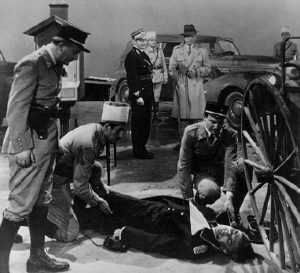Doing the Usual: Asset or Liability?
 “Major Strasser has been shot. Round up the usual suspects.”
“Major Strasser has been shot. Round up the usual suspects.”
– Captain Renault in “Casablanca”
Any aficionado of old movies will recognize those classic lines from the last scene of ‘Casablanca.’ And, although Rick (Humphrey Bogart) shot Strasser, no one questioned Renault’s (Claude Rains) order, because it was typical both of him, and of the circumstances in which they lived.
But those words have meaning far beyond a movie script. It’s a typical response for many businesses as well. We tend to do what we’ve always done so we don’t have to think of something new. It’s expedient. Once upon a time we learned that it worked. That was good. Besides, it allowed us to remain in our comfort zone. It was not only a fallback, but an asset.
But doing the usual isn’t a strategy. In fact, it can be dangerous business. What worked well once or twice when you scored well, can’t be relied on. When it fails, you discover that what you once considered an asset has become an abject liability.
How does it happen? Simple. Life evolves. Things change. Situations change. People will never be predictable. If you don’t bend, the only thing static and predictable in the process will be you.
What do you do about it? Clearly, when you’re in a rut it’s comforting to try to return to old familiar habits that had always been your failsafe, but oftentimes the past cannot be leveraged into present and future solutions.
What you can leverage though is the process that taught you how to think strategically, and calling upon your inner strengths to carry you forward to your goals. It involves not only using standard strategic protocols, but most importantly, harnessing your leadership assets to create a winning strategy.
Einstein said, ‘“The world as we have created it is a process of our thinking. It cannot be changed without changing our thinking.”
Let’s work on that.
Toss out that old list of usual ‘suspects’ and create a new one. There will always be a situation you cannot control, but by building an arsenal of assets you can rely on, you’ll be able to steer through whatever changes come your way.
Find your true assets by shifting your perspective and focusing on your strengths, and the strengths of your team. By making it inclusive, you can overcome any obstacle in your path and create winning situations for yourself and those around you.
Dr. Kathryn Cramer’s book, ‘Lead Positive: What Highly Effective Leaders See, Say, and Do,’ demonstrates how a shift in perspective can make the difference between success and failure. Here are a few tips.
- Your optimism and confidence inspires your team to jump on the bandwagon with you, adding to the momentum. Positive energy is contagious!
- Use words to reframe negatives into positives:
- Instead of seeing obstacles as hurdles to muddle through or bypass, learn to look at them as opportunities to build resilience and strength.
- Instead of being overwhelmed by the challenges ahead, think of them, think of all the possibilities for creative thinking they provide.
- Monitor how you’re feeling at various times during the day. Use your emotional intelligence – be intuitive – and understand why you feel the way you do, and then let go of it. Move on.
- Say what you mean and mean what you say. Set an example.
- Be curious. Ask yourself, ‘What if.’ You’ll be amazed at how many once closed doors open up to us.
With that in mind, analyze your stumbling blocks and chose the path that will most likely minimize any potential loss and/or maximize the potential gains.
- Develop a step by step plan to implement it.
- Figure out how much it would cost – both in dollars and man hours to make it work.
- Take the approach that would have the greatest impact, at the least cost without sacrificing quality.
I’ve found that asset management helps leaders lead with more assurance and clarity, gain trust, and inspire loyalty. and follow your And, we all know at that point, that a successful outcome is waiting in the wings.
“Louie, I think this is the beginning of a beautiful friendship.”
– Rick
